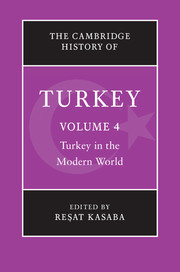5 - The struggle for independence
from PART I - OTTOMAN BACKGROUND AND TRANSITION
Published online by Cambridge University Press: 28 November 2009
Summary
An investigation of modern Turkey’s roots, of its political traditions, socio-economic transformations, and cultural heritage, can reasonably start in the early centuries of the Ottoman Empire. The emergence of Turkey as sovereign nation-state, though, occurred late, when its new boundaries were determined with international recognition in 1923, and the community inhabiting its current space reimagined itself through the Republican state’s programmatic effort to inculcate a novel understanding of nationhood. While inflected by the transformations of the past, both nationhood and stateness as they crystallised in the 1920s bore a direct and overwhelming imprint of the contingencies of the previous decade’s wars. This decade of warfare began with the Ottoman–Italian war over Libya in 1911 and culminated in a struggle for independence in those territories of the Ottoman Empire that remained unoccupied at the signing of an armistice in October 1918 but were subsequently encroached upon by the Entente (or ‘Allied’) forces.
The profound transformations of war in the empire’s truncated territories set the stage for the Turkish, or Kemalist, revolution. In the pantheon of twentieth-century Middle Eastern revolutions, ranging from military coups d’état and revolts against colonial rule to regime change with profound social repercussions, the Kemalist revolution has a unique place. It followed from an independence movement that entailed sustained armed struggle and stands out as the prototype of anti-imperialist liberation movements in the twentieth century.
- Type
- Chapter
- Information
- The Cambridge History of Turkey , pp. 112 - 146Publisher: Cambridge University PressPrint publication year: 2008
References
- 8
- Cited by



